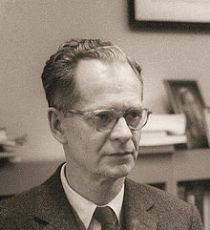For a long time I have considered myself an introspective person, and I have attributed what wisdom I posses to this attribute. Others have noted before me that the self is the greatest opportunity to understand the social world and its behaviours for the reason that the self is always around to be observed. In fact of all people, we cannot escape only ourselves. Of course any scientific observation of an n = 1 sample group may be questioned – but we can escape this paradox if we apply experiment on what we have discovered through introspection to others in our world. Social experimentation. Interaction with people as a way to prove hypotheses of human behaviour theory.
I have been considering self-control and the role and extent of autocracy of the personal will on one’s own behaviour. As such I began looking for research material on the subject, which lead me to BF Skinner and the work I will start to summarise and perform exegesis upon below.
But first a short word on Burrhus Frederic “B. F.” Skinner:
| B.F. Skinner was an american psychologist, behaviorist, author, inventor, and social philosopher. He was the Edgar Pierce Professor of Psychology at Harvard University from 1958 until his retirement in 1974. Most notably, Skinner invented “radical behaviourism” and even more interestingly the “Skinner Box” or what is more officially called the “operant conditioning chamber”:
“The box had a lever and a food tray, and a hungry rat could get food delivered to the tray by pressing the lever. Skinner observed that when a rat was put in the box, it would wander around, sniffing and exploring, and would usually press the bar by accident, at which point a food pellet would drop into the tray. After that happened, the rate of bar pressing would increase dramatically and remain high until the rat was no longer hungry.” Credits to http://en.wikipedia.org/wiki/B._F._Skinner |
Now some thoughts on the book itself.
Chapter one has some interesting ideas. It begins with the question “Can science help?” and goes on to elucidate on the goods and bads of the scientific era (these past few hundred years) in which there has been an exponential increase in scientific discovery. Skinner’s position is that natural science has developed so fast as to leave the science of human nature behind – thus causing imbalance in our world.
Humanity develops its understanding of technologies which have major effect on our social world and it discovers and defines laws and relationships in the natural world by which we can predict the effects of natural processes (enabling such things as atomic bombs and aeroplanes through nuclear fusion and fluid mechanics in aeronautics) but we do not apply the same drive and energy into discovering and defining the laws and relationships in the world of human nature with which we could predict the outcomes of our scientific creations (such as Hiroshima, 9/11, etc).
Skinner goes on to argue against those who rebel against the idea that human behaviour can in fact be understood through defined laws and relationships. On a side-note, it amazes me that the world has come so far and yet our common understanding of human nature is still mostly agnostic. We all agree on principles such as gravity but we don’t all share agreement on what motivates human decisions.
Why is it that advances in the hard and pure sciences such as mathematics, physics, chemistry, biology are pursued so vehemently and yet the very thing that drives those motivations and the thing that will inevitably make use of them remains esoteric? Psychology, philosophy and religion have much to say on these questions, but their consideration is diminished in light of technological advancement. Perhaps science will slow down in a century or two and a renaissance like age of psychology, philosophy and religion will emanate instead. The utopian satirist author Samuel Butler plays on this idea in his novel Erewhon, where ‘the instruments and products of science were put into museums – as vestiges of a stage in the evolution of human culture which did not survive.’
The question still remains however, is human nature subject to behavioural theory and prediction? What percentage of human behaviour is a categorical response to external stimuli and what percentage is not? Experiments like Skinner’s box and Pavlov’s bell suggest some relationship. Skinner’s next chapter begins to dig into this “Science of Behaviour” as he tries to show the extent to which the study of people’s actions are subject to the same methodology as is used in the hard sciences.
I aim to determine from his theories the relationships between and key principles behind free will and self-control.
Lastly, here is a brief interview with Skinner:



